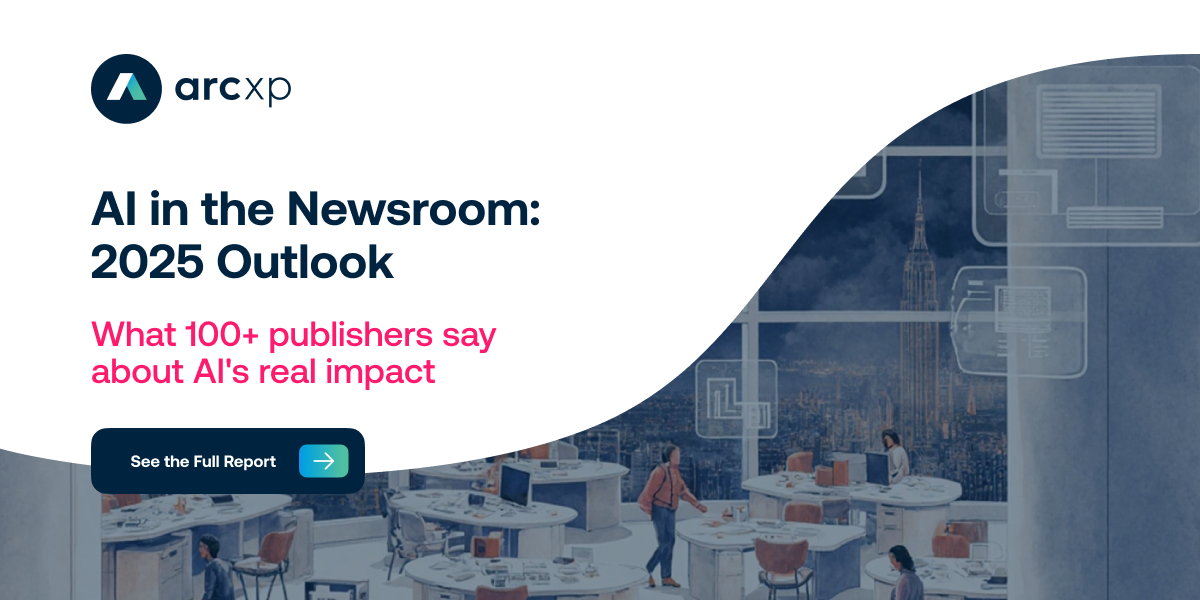Parallel worlds
Filter bubbles were just the start

In case you missed it, you can check out the replay of a discussion I had this week with A Media Operator’s Jacob Donnelly. We went into independent media models we like, particularly in modernized B2B. You can register to get the replay here.
Lately, I’ve noticed the feeling that something is off. This is common in many I speak to, and it is likely a combination of the lingering aftereffects of the pandemic – you can’t scramble society like that without lasting effects – and the vast uncertainties of AI. This is across the economy and society, but media always goes first, for better or worse. One of the defining features of this moment is the creation of parallel worlds. First up, a message from ArcXP.

What 100+ media companies told us about AI

AI is no longer a future bet—it’s a newsroom essential. In this exclusive State of the Industry report, Digiday and Arc XP surveyed over 100 media leaders to uncover how publishers and broadcasters are actually using AI today, what’s working, and where challenges remain.
Whether you’re just starting to explore AI or scaling existing tools, this report provides a grounded, data-backed look at how your peers are navigating the AI landscape—and what it means for the future of journalism.
Parallel worlds
One of the defining features of the Information Space is the feeling of disorientation. I got that feeling about a half hour into a podcast in which Tucker Carlson and Candace Owens were connecting the dots to explain to me why Brigitte Macron is a man.
There was a time, not so long ago, I would find this completely bonkers. But this kind of thing is now the norm. It’s just another outlandish topic that flies by, jostling for attention with what Comic Dave Smith has found out about World War II in a Wikipedia footnote, the imminent arrest of Barack Obama for treason, Nick Fuentes denouncing Tucker Carlson as a CIA agent, Mehdi Hassan dominating a Jubilee brawl with right-wing teenagers, fights about eugenics in jeans ads, and a lot of Epstein.
I’ve long tried to be ecumenical in my media consumption, and over the last few months I’ve made an earnest effort to understand the appeal of the world of alternative media, the strange and amorphous grouping of New Right podcasters and YouTubers, X shitposters, geopolitically inclined comedians, and leading public intellectual Catturd.
We increasingly operate in parallel worlds, each with its own set of realities. I don’t see how it would be possible for most people to have a shared grasp of reality under such an onslaught. It’s hard to marinate in all of this undeniably compelling content from charismatic carnival barkers without feeling that you might be going insane.
The hand-wringing over filter bubbles assumed there was a shared reality. Eli Pariser developed the filter bubble thesis in 2011, in a prescient observation of how algorithmic feeds would nudge people through personalization into self-reinforcing bubbles. Only this assumed these bubbles were deviations from a shared center.
That’s now fractured. The Information Space has developed parallel worlds that can take the raw material of “facts” and refine them into ideological objects that reaffirm identity. A crazy person shoots up an office in Midtown becomes simply a a prompt to fit into a preferred narrative, whether that's the specter of left-wing violence, the role of PE in the housing shortage or the acumen of bankers organizing a barricade.
Venture capitalist Marc Andreessen correctly identifies Trump as a bridge figure. He’s a complete creature of Old Media, with a New York tabloid sensibility honed over decades of courting coverage and being a fixture in it. And yet Trump is also a WWE devotee, which is essential in the Information Space, where the performance is the point. Storylines need to be continued and refreshed regularly. Allies can become enemies. The old growth hacks of listicles and curiosity-gap headlines have given way to far more sophisticated engagement farming. This requires a lust for combat. Never have debate club kids had more leverage. Someone like Nick Fuentes is dangerous because he's a native species of the Information Space. He was born in the dark, etc.
Andreessen believes a true digitally native politician will soon emerge out of the Information Space. Much was made out of the reticence of Democratic politicians to enter the world of alternative media. The tightly scripted typical campaign doesn’t match up with the freewheeling brawling of the Information Space. This is in many ways a successor to trash TV of the 1990s, when Morton Downey Jr and Jerry Springer were signs of societal decline. Shock jocks emerged in this period. Howard Stern’s future at SiriusXM is reportedly in doubt. Stern, like the late-night TV hosts, is a relic of a past era. Spending time in alternative media makes Stern like a late-career Jimmy Connors hitting two-handed backhands against Andre Agassi.
After the election, there was an assumption that The Brands would shift spending to alternative media. I don't observe that happening. Alternative media is part of a larger project to create parallel institutions from the mainstream. There’s even a somewhat janky tech stack, with Truth Social (social), Rumble (video) and Citizens (newsletters/community). The ad base on these programs is not blue-chip brands but the hustlers of late-night direct TV. Tucker is hawking his own Zyn knockoff, prepper kits, pistols and VPNs. Glenn Greenwald is partial to CBD for dogs. These shows often have services that will negotiate with the IRS on your behalf. Steve Bannon is monitoring the situation with the BRICs and wants to get you into a gold ETF. I often wish Hunter Thompson was around for this.
Something similar is happening with tech. The tech industry is creating a parallel media ecosystem within the Information Space, taking a very engineering approach by deconstructing the machine and reverse engineering it. You need to start with politics, because that's where the contours of the Information Space are most apparent.
Andreessen’s many podcasts about media, along with others his venture firm has done with figures like Balaji Srinivasan, lay out an ideology to underpin this project. The first step was to spend years establishing a victim narrative with journalists as the Enemies of the (Tech) People. The grievance narrative is The good guys have been under attack by hit pieces by a corrupt corporate media that is simultaneously irrelevant but also an engine of the Deep State; died-in-the-wool Communists who are also jealous of tech wealth; and know-it-alls who lack the intellectual horsepower required for engineering. The details can be confusing, but everyone speaks with unbridled confidence at 2.5x speed, so you tend to gloss over inconsistencies.
Listening to many hours of these critiques and bromides, I find myself agreeing on some discrete aspects but not the sweeping conclusions that are fairly conspiratorial. You quickly realize these very intelligent people are not being completely intellectually honest in making their cases. Instead, they’re looking to delegitimize what they perceive as competition for influence in the Information Space. As Balaji says, Silicon Valley is a fork of the media establishment.
When you break down the drivers of the Information Space, you recognize that you must identify an enemy, eliminate all nuance, and mercilessly attack the caricature you’ve created. There’s an irony here in that the tech elite does have a case that a lot of adversarial journalism over the post-2016 era was overly simplistic and narrative driven. They’re doing the same thing in response. I’ve sometimes thought this is a performance art to prove the point that outsiders to an industry can take a set of facts and connect dots that do not connect in order to tell a very neat Manichean story that’s very different from the messy reality.
This serves a purpose. In this view, journalists should do the dirty work of mining raw materials of facts, while the refinement is done by the Men in the Arena. This makes sense as mining raw materials tends not to have as high of value as refining those materials into finished products. Tech doesn’t want to work the refs, it wants to replace the refs to a large degree with an ecosystem of go-direct owned media and friendly media funded by rounding errors off their balance sheets. Oligarchs tend to love the Creator Economy because it's fragmented and therefore easy to dominate as opposed to institutional media. This is why the new access journalism is being ideologically friendly or at least savvy enough to offer only token resistance.
This is quite a turnaround to anyone who has experienced the tech-media nexus for a while. The tech industry was treated with kid gloves for a generation. If anything, the media served as reliable cheerleaders who swallowed the zany kids in a garage narrative and dutifully reflected it. The sharp turn in 2016 is correctly identified by Andreessen as a turning point in what was a mostly cozy relationship. Up until that point, tech giants were hardly raked over the coals. From the media side, this is simply a case of tech emerging as a leading societal power center to be treated in similar ways as other power centers.
In the tech view, the institutional media industrial complex saw their power and businesses eroding and therefore went to war with tech. Efforts at buying detente were rebuffed, so in true Balaji fashion, the tech powerbrokers chose exit and to create their own set of parallel media institutions, from directly owned operations to reliably friendly outlets that are funded directly or indirectly with tech largesse and access.
This has been a long-term project with plenty of false starts. Andreesen co-founded Ning and funded Clubhouse, after all. There was the effort to fund a TechCrunch competitor in Pando Daily that ended up in a disaster as the journalists ended up turning adversarial anyway. Better instead to skip journalists altogether in favor of narrators from within the tech tribe, which is why you are more likely to see Mark Zuckerberg talk to a figure like polymath prodigy Dwarkesh Patel than a journalist.
In the end, this is about control. I understand why someone wouldn’t want to give control over their narrative – at least in their view, it’s their narrative – to others who they view as hostile by default for both ideological and economic reasons. In this view, participation as the subject of stories hasn’t worked. Instead, it’s better to create a parallel world where they maintain ultimate control of the narrative.
Thanks for reading. Send me your feedback by hitting reply.
For partnership information, check out how we work with partners like ArcXP here and get in touch at bmorrissey@therebooting.com.



